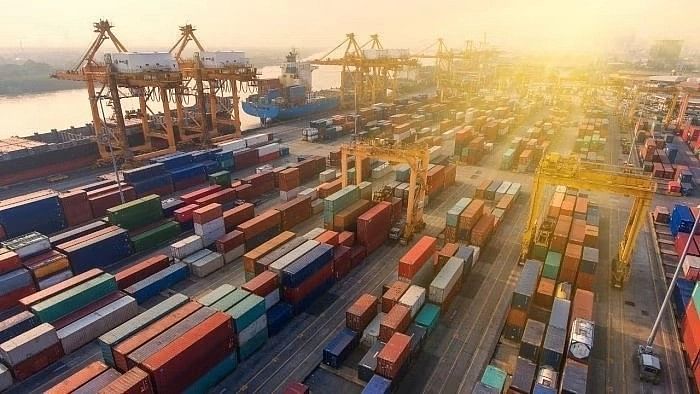
Representative image.
Credit: iStock Photo
New Delhi: After remaining in the positive zone for three months, India's exports contracted 1.2 per cent to Rs 2.85 lakh crores ($33.98 billion) in July, while the trade deficit widened to Rs 1.98 lakh crores ($23.5 billion).
According to government data, imports rose by about 7.45 per cent to Rs. 4.83 lakh crores ($57.48 billion) in July due to a jump in the inbound shipments of crude oil, silver and electronic goods.
Crude oil imports rose 17.44 per cent to Rs 1.16 lakh crores ($13.87 billion), while silver imports jumped 439 per cent to Rs 1,391 crores ($165.74 million) during the month under review.
The trade deficit, or the gap between imports and exports, was Rs 1.76 lakh crores ($21 billion) in June and Rs 1.62 lakh crores ($19.3 billion) in July 2023.
Briefing media on data, Commerce Secretary Sunil Barthwal said that going by the current trend, the country's total exports of goods and services will cross last year's figure of Rs 65.3 lakh crores ($778 billion).
He said that one of the reasons for the dip in merchandise exports is the fall in the shipments of petroleum products, which has declined by 22.15 per cent to Rs 43,650 crores ($5.22 billion).
Fall in prices, low demand and increasing domestic consumption have led to a dip in the exports of petroleum products in July.
The other export sectors, which have recorded negative growth during the month, include rice, cashew, oil seeds, marine products, gems and jewellery, chemicals, and cotton yarn/fabrics.
Gold imports dipped by 10.65 per cent to Rs 26,272 crores ($3.13 billion) in July.
However, electronic goods, pharma and engineering exports rose 37.31 per cent, 8.36 per cent and 3.66 per cent, respectively, in July.
India's merchandise exports increased 2.56 per cent to Rs 2.95 lakh crores ($35.2 billion) in June, even as the trade deficit widened to Rs 1.76 lakh crores ($20.98 billion).
Exports during April-July this fiscal surged 4.15 per cent to Rs 12.1 lakh crores ($144.12 billion), and imports grew 7.57 per cent to Rs. 19.28 lakh crores ($229.7 billion).
The merchandise trade deficit during the first four months of this fiscal has widened to Rs 7.18 lakh crores ($85.58 billion) compared to Rs Rs 6.3 lakh crores ($75.15 billion) during April-July 2023.
The estimated value of service exports during April-July 2024 stood at Rs 9.85 lakh crores ($117.35 billion) compared to Rs 8.96 lakh crores ($106.79 billion) in April-July 2023. In the same period, the imports were projected at Rs 5.28 lakh crores ($62.95 billion).
Barthwal said the ministry is taking measures to push the exports to different geographies like Africa, which is being served by the US, Europe and China.
"We are in touch with export promotion councils and exporters...With a slight push, we can do extremely well in the organic sector...We are also looking at the e-commerce market and we will be coming up with several schemes," he added.
The secretary said that one scheme - e-commerce hubs - was announced in the Budget.
"We feel that is another area with some push, we will be able to increase our exports," he said, adding that through e-commerce, organic products and tapping opportunities in new territories like Africa, "we feel that we can give a big export push" despite global uncertainties.
Federation of Indian Export Organisations (FIEO) President Ashwani Kumar said that issues like high freight rates, fall in commodity prices, and inadequate availability of vessels and containers are hurting the exports.
"I think, from next month, the situation may improve," Kumar said, adding that the situation in Bangladesh is improving, but "certain Indian businesses have not yet opened their factories yet".
The ongoing Russia-Ukraine war, coupled with various major geo-political tensions, including the Red Sea crisis and the Israel-Hamas conflict, has also made the international trade scenario much tougher for Indian exporters.